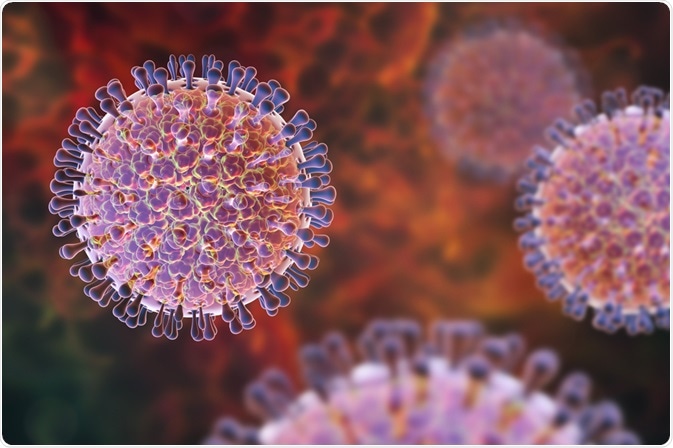Rotaviruses are principal etiological agents of acute gastroenteritis in infants and young children around the world. These non-enveloped viruses enter human cells by various types of endocytosis and, depending on the virus strain, travel to different endosomal compartments before exiting the cytosolic space.

Image Credit: Kateryna Kon/Shutterstock.com
Studies have shown a broad range of responses to rotavirus infection – from a complete lack of symptoms to severe illness that can be associated with dehydration and circulatory collapse. Clinical features and stool characteristics are non-specific, which means that similar illnesses may be caused by other pathogens. As a result, confirmation of this diagnosis requires specific laboratory testing.
Clinical manifestations
Rotavirus gastroenteritis represents a mild to severe disease characterized by vomiting, low-grade fever, and watery diarrhea. The incubation period ranges from 18 to 48 hours with vomiting as the initial symptom, followed by diarrhea that lasts for approximately one week. Often there are fewer than 10 non-bloody (albeit mucusy) bowel movements per day.
In newborn children, rotaviral infection is most often asymptomatic or mild as a result of passive transplacental transfer of antibodies against the virus. In infants from 6 months to 2 years of age, symptoms tend to start with a sudden onset of severe vomiting, followed by 4-8 days of diarrhea with fever.
In adults, the disease typically manifests with malaise, nausea, headache, abdominal cramping, fever, and non-bloody diarrhea. Other symptoms may include muscle pain, joint stiffness, and excessive sweating. Severe symptoms can occur in the elderly and immunocompromised individuals.
Few singular features are used to distinguish those who have gastroenteritis caused by rotavirus versus those with other causes of gastroenteritis. The presence of all three symptoms (vomiting, fever, and diarrhea) is reported more commonly with rotavirus than with other gastrointestinal viruses.
The illness usually lasts for 3-8 days, but the virus can be shed in the stool for up to one month. Subsequent asymptomatic infections may occur due to immune protection. Some studies of children with rotavirus have shown that certain respiratory symptoms (such as runny nose and cough) can be coexistent with intestinal manifestations.
Potential complications
Dehydration is the most common complication and cause of death in rotaviral diarrhea. The amount of weight loss as a percentage of normal body weight provides the best estimate of the severity of dehydration. Clinical signs that include lethargy, dry and cool skin, absence of tears when crying, dry mouth, sunken eyes, as well as extreme thirst are usually not present until the child has lost at least 4% of their body weight.
A large number of clinical studies show that rotaviruses could be found at extraintestinal sites following infection. Children who are immunocompromised (due to congenital immunodeficiency or organ transplantation) may have evidence of abnormalities in multiple organ systems – particularly the kidney and liver. Acute pancreatitis as a complication of rotaviral gastroenteritis is also described in the literature.
Approximately 4% of patients with rotavirus may have complications related to the central nervous system, although causal relationship remains elusive. Patients with rotavirus gastroenteritis and benign or severe convulsions (or even encephalitis) have been found to have evidence of rotavirus in the cerebrospinal fluid using reverse-transcription polymerase chain reaction (RT-PCR).
References
Further Reading
Last Updated: Jul 18, 2023